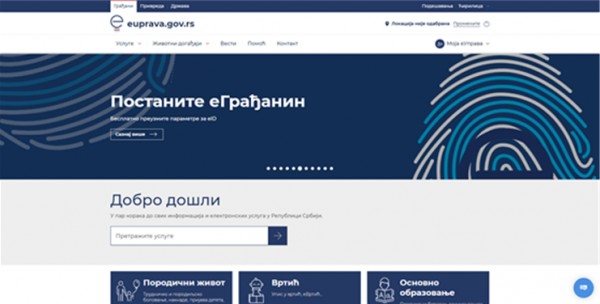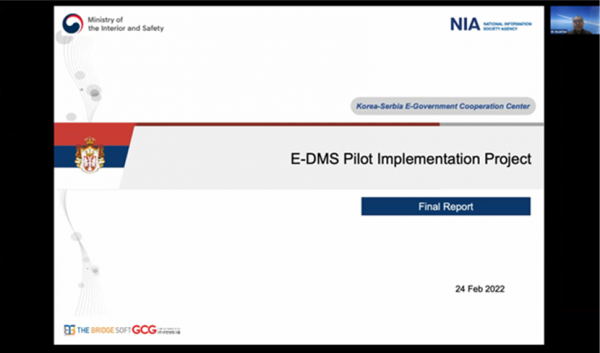Exploring opportunities to enter the Balkan market using the experience and know-how of Korean companies
E-Government Wind Blows in Serbia
Serbia's E-Government Status
The Serbian government is actively promoting e-government projects to realize more efficient e-government. Starting with the opening of an e-government portal in 2010, services such as e-signature, e-document submission, and e-approval were introduced in 2015. In 2017, the Office of IT and E-Government (OITeG) was established to plan and coordinate public sector digitization projects.
<Serbia e-Government portal website >

[Source: Serbia electronic information portal website]
Currently, more than 100 government agencies in Serbia are providing various electronic services such as document issuance (individual, health insurance, birth certificate), tax administration services (tax payment, incentive application), and electronic foreigner service (visa and residence application). However, digital services at the Korean level are not provided. Most of the work is still handled through on-site visits, and it can be seen that they are still in the stage of digitization. The UN indexes and evaluates the digital services of governments around the world every year. Serbia's ranking is not high at 58th, but the ranking continues to rise as Serbia's efforts to improve e-government are reflected.

[Source: UN]
Korea-Serbia Cooperation Plan
Korea is the country with the second largest e-government infrastructure as of 2020 (based on the UN). Korea is evaluated as an exemplary case of providing convenient and effective services by applying digital technology to government platforms. The demand from governments and companies around the world to cooperate with Korean companies with excellent technology is also increasing. Serbia is also hoping for cooperation with Korean companies that have e-Government-related technologies.
The Serbian government selects specific areas for cooperation with Korea according to the current status of e-Government. Prior to project implementation, a detailed analysis of existing services is conducted to devise a solution tailored to the needs of the beneficiary organization, and the project is carried out with a Korean company selected through an open bidding. Korean companies are given the opportunity to introduce their solutions to new markets and meet potential business partners. Most of the projects are conceived as pilot projects and then expanded to other government agencies.
For the past several years, Korea has supported the digitization of the Serbian government and public services through donations, know-how sharing, and educational activities. In particular, the Korea Development Institute (KDI) and the Korea Intelligent Information Society Agency (NIA) are actively supporting the development of e-government in Serbia. As part of the support program, various projects are underway, such as KDI's knowledge sharing program in the field of cloud-based data center and smart city technology, NIA's establishment of a Serbian-Korean information access center for the education of Belgrade city officials, and implementation of e-government solutions such as electronic document management. there is.
On February 2, KOTRA's Belgrade Trade Center, NIA, and Serbia's OITeG collaborated to hold an online Korea-Serbia e-Government Cooperation Forum on February 24. In addition to international organizations such as the World Bank, various public and private panels from Korea and Serbia, such as Samsung, The Bridge Soft, and Netset Global, attended the forum to introduce their respective projects and discuss ways to cooperate. In addition to government-led cooperation, there was an opportunity to review business cooperation opportunities between Korean and Serbian private companies.
World Bank's chief public sector expert, Mr. Sradjan Svircev said, “Through this forum, it was very beneficial to see that Korean and Serbian companies have the same approach to e-government projects. There will be results,” he added.
<Korea-Serbia Digital Cooperation Forum>

[Source: Directly filmed at the KOTRA Belgrade Trade Center]
Characteristics of Serbia's e-Government Market
The characteristics of Serbia's e-government are as follows. The World Bank-led e-government revitalization policy and the introduction of AI services.
The Serbian government's comprehensive effort on digitalization started with the World Bank's “E-Government Project Revitalization” (EDGe Project). EDGe is an institutional reform and innovation project to support digital transformation in the public sector. Most of Serbia's e-government projects are being funded by the World Bank. The project aims to improve the accessibility, quality and efficiency of selected administrative procedures and e-Government services for citizens, businesses and government agencies. Equipment and software are procured through international open bidding.
The second characteristic is an attempt to introduce AI technology to e-government. Serbia's AI development started in earnest in 2019 with the introduction of the 2020-2025 Serbian AI development strategy. Through this strategy, policies to introduce AI in the public sector, improve electronic public registration data, service automation, and support equipment procurement for SMEs are being implemented. The Serbian government built a national AI platform in a data center in the Kraguyeva province last December. It is expected that the number of digital information that can be processed through the introduction of AI platforms will increase exponentially.
implication
Serbia is a meaningful country for Korean companies planning to advance into the Balkans in terms of geopolitical, political and economic aspects. After accumulating a reference in Serbia, there are many cases of advancing to other countries in the neighboring Balkans. Currently, Serbia's e-Government project is focused on key areas and is concentrating on the establishment of digitalization infrastructure. A key challenge for e-Government is to obtain the solutions needed to connect all organizations together while meeting the requirements of different organizations. Each government agency has specific needs according to the characteristics of the agency. Since procurement conditions tailored to individual characteristics can only be met by local companies, it can be a major strategy for Korean companies to approach the project through cooperation with local partners.
The BridgeSoft, which cooperates with Serbia through a pilot project, emphasized that in the process of e-government cooperation, it is more important to change the culture of the public sector than to change the system. The public sector is vulnerable to change management, so it has no choice but to seek help from the private sector. The technologies and strategies of Korean companies with experience in digitizing public services can be of great help to the Serbian government. The Serbian government also wants to collaborate with experienced companies. The optimal time has come for Korean companies seeking business in the e-Government sector.
Source: Comprehensive data from KOTRA Belgrade Trade Center



